Having followed filmmaker Lewis Arnold’s career, from burgeoning film school student to go-to TV director, after talking to him last year about his career so far for our Short List series I was convinced next time we’d have him back on S/W would be to discuss the launch of his upcoming mini-series Des. However, not content with the imminent release of what will surely be one of the most-discussed small screen releases of 2020, Arnold has spent a large portion of his recent time developing Directors Now – a free online resource featuring the breakout stories of 100+ directors working in the industry today.
Originating as something he put together for the students he was teaching at the University of Gloucestershire, Directors Now features a number of filmmaker stories we’ve eagerly followed on Short of the Week, with Alice Seabright, Rob Savage, Nick Rowland, Mustapha Kseibati, Eva Riley and Koby Adom among the directors offering insight to the project. Hoping his project will be an important reference for “anyone who’s interested in a career in filmmaking”, I jumped on a Zoom call with Arnold to discuss the aims and inspirations of his project.
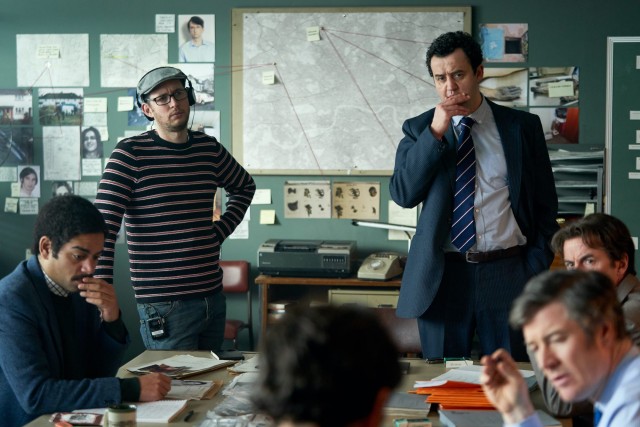
Lewis Arnold (left) on the set of TV show Des shares his own journey in Directors Now
Welcome back to Short of the Week Lewis, sounds like 2020 has been a busy one for you, how did you manage to find time to create Directors Now, while also finishing off Des?
I didn’t realize how much work it was going to be, to be honest. When lockdown happened I was teaching at the University of Gloucestershire and I was doing a little bit at Bristol University. The filmmakers there weren’t able to make their graduation films, they were all feeling pretty downhearted about the future and what they could do, and so I wanted to do something for them. I think I’d had this idea for ages but I’d never acted on it, this gave me the catalyst to get it done.
I initially contacted Will McGregor and ran it by him as an idea. Will is a filmmaker who works across TV, film, and commercial. We were sitting and chatting about it and he said, “Yeah, I think it’s great,” and he was the first contributor, along with Andrew Cumming who is my old flatmate, we studied NFTS together. Their response spurred me on, I initially asked 10 filmmakers and then it grew into 40. The first iteration of the project was 40 filmmakers given to the 300 students, across the two universities.
“They felt that it was an incredible resource and that we should do something with it”
It was made for those students specifically and on delivering it we got lots of lovely feedback. The students themselves were really grateful and the lecturers felt that it was a really great resource. More importantly, all the other directors, as they saw it and signed off on it, came back to me saying that they felt that it was an incredible resource and that we should do something with it. But, I didn’t really know what to do with it.
I had no interest in publishing it because I thought there were too many issues with money and I wanted it to be accessible for everyone. I was put in contact with Neville Pierce, we had a couple of chats and he was the one that suggested if I could find a couple of sponsors, then I could basically create a website to host and download the document.
I put together a pack and I expected to go out to like five different places to get a small donation from each. In the end, the NFTS (Jon Wardle) said they’d give me most of the money to do it and to support the project, which was fantastic. As an ex-graduate, the NFTS wants to support me, but also they saw in the project something that was a really valuable asset for young aspiring filmmakers.
“There’s a real community of people out there that understand how tricky the industry is”
That’s where it was built from and how it grew, and from then I kind of became obsessed by the idea of launching with 100 filmmakers. I could have just launched it and been happy with those initial 41 filmmakers, but for some reason, I felt that wasn’t good enough and decided to start publicizing that there were 100 directors on it. In the end, I had to ask 150 directors to get the final 105.
I think there’s a real community of people out there that understand how tricky the industry is, especially right now. It’s not an easy industry to get into anyway, but right now with COVID and with the world kind of shut down it’s really tricky, but I was genuinely surprised by the generosity of all of the directors and filmmakers involved.
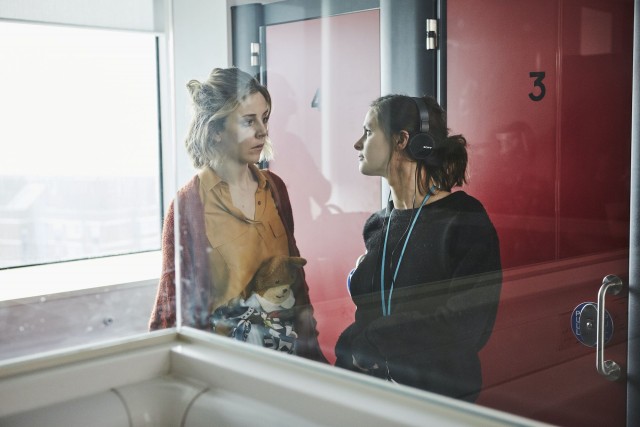
Alice Seabright, a filmmaker twice featured on Short of the Week, has shared her story with Directors Now
I know the project was originally created for your students, but with the project has grown much bigger than that initial idea, who do you see using the resource now it’s free and available to all?
For me, I hope it’s anyone who’s interested in filmmaking, even if they might not know where their discipline or craft lies. But it was originally created for aspiring filmmakers and I use the term filmmaker because it’s not just for directors. I think the journeys of these people apply across multiple disciplines and I think DoPs, editors, producers etc might be interested in learning about certain directors who they admire. But then it’s an incredibly interesting read and so could be something for already established filmmakers as well.
“The key people it was built for are those younger, emerging filmmakers”
I’ve found it fascinating reading about the journeys myself. As someone that’s not made my first film, hearing the stories of filmmakers and the experience of making their first film was incredible. I also think established filmmakers will be really surprised by the honesty and the brevity that people have spoken about the journey, the difficulties and the hardships. Lots of filmmakers have been particularly honest with the battles, the mental struggles and battles that you have as a director.
So yes, I was initially aiming it at aspiring filmmakers, but I do think that it’s an interesting read for anybody who’s interested in filmmaking and the process, including the established directors. I think it has broad appeal, but the key people it was built for are those younger, emerging filmmakers who are still working on their career trajectory.
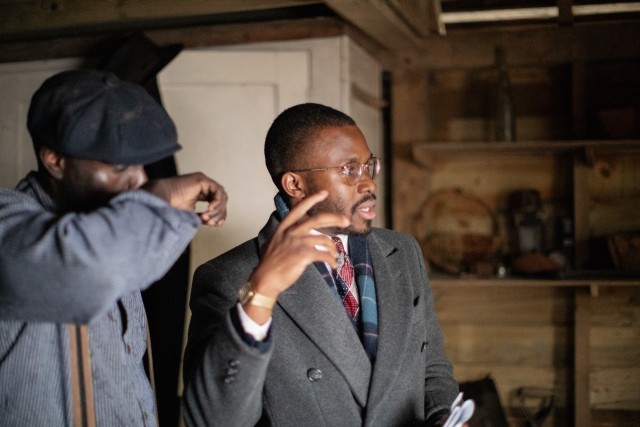
You can find out more about upcoming filmmaker Tomisin Adepeju’s (Appreciation) journey in Directors Now
Ok, let’s talk about the directors involved, how did you decide on which stories you wanted as part of the bigger project?
At first, I started out by going to the people I knew, but when I knew I wanted to do it to 100 directors then I had to start asking people that I only kind of knew or knew of, by going through someone else. I basically started relying a lot on other people.
“I wanted whoever reads the document for them to be able to find somebody in that document who has a story they could relate to”
The key for me was that I wanted whoever reads the document for them to be able to find somebody in that document who has a story they could relate to. So I had to go out and find people that I didn’t know, and that’s quite difficult to do as a director, to go and start pestering your peers.
Then once I got them involved, a lot of them were open to suggesting other people they knew and putting me in touch. To get 100 filmmakers it was tricky, and when you’re badgering people that you don’t know that well, it started to become a lot of work and a lot of stress.
There are lots of young, fresh faces in there, like Rob Savage, who’s just done Host and that’s blown up. There are also people, like James Strong, who have been working for many years and who you just know are going to do a massive Hollywood film in the next year or so. I decided early on that I needed to be flexible and open as the industry is not just open to young people and the breaks happen at various stages in people’s careers.
Some directors, who may have felt they’d been around a while, did say to me, “Do you really want me to do this?” and I was like, “Yes, I do because there might be something in your journey that’s really relevant now, and also, who’s to say that your next project doesn’t win seven BAFTAs and you are the next new thing?”.
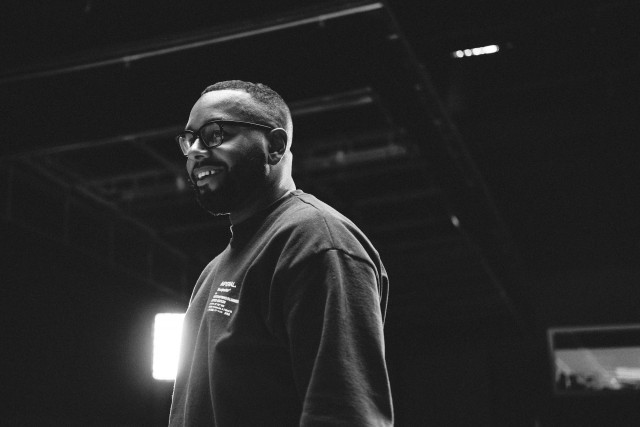
Rohan Blair-Mangat was one of 100+ directors asked the 5 questions by Arnold
I know myself, that trying to work out the best questions to ask is not always an easy thing, how did you approach trying to get the essential information from those you spoke to?
Some directors wrote a paragraph per question, some directors wrote essays. I said to them “it’s up to you, give as much or as little as you can timewise”. In terms of the questions themselves, I wanted to keep it to five questions because I was asking a lot from them and I know from doing this myself how long it takes. The first thing I did was I tested myself and wrote my own journey down, and broke that down into the questions that I felt I needed to ask.
“The questions were just a guide to get a sense of that journey”
Then I tested it on Will McGregor and Andrew Cumming, so, I kind of used myself and two people who I trusted and felt that I could ask. When I thought I’d got the questions, I said to everybody, “use the questions as a guide to really give a sense of your journey”. Again, some of the directors only answered the questions all combined, and I tried to reflect that if possible, but the questions were just a guide to get a sense of that journey.
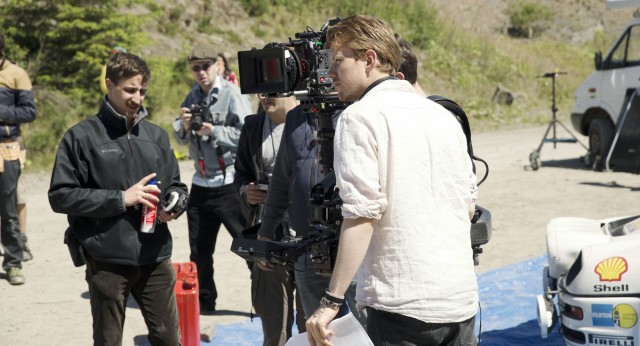
Director Nick Rowland recently made his first feature and shares his story
So with the project now launched, do you have any plans to return to it in the future and add more filmmakers?
I imagine every time I’m sitting in the back of an edit and I’ve got time, I’ll look at it and I’ll go, “Who’s out there?” There might be five or six filmmakers I’ll add to the document and to the website. I’ve been speaking to a couple of producers about possibly doing a producing one down the line, so I think there is scope for that. My feeling very much is that I want to see how this one is received, how this goes down, and see if there’s an appetite for other versions of this. That’s why we built the website, so that we could keep adding and using the Twitter feed to basically update the audience on new additions.
“The idea is to continue to grow it”
I imagine given the way time works for me, there’ll be periods where I’ll have a few weeks and I’ll be able to just dedicate some time to it. I’m keeping lists, I’ve got a massive Excel document of everybody I asked and their responses, and people that I wanted to ask but didn’t ask, and I’ll keep updating that as I go when I see new films or meet new filmmakers. The idea is to continue to grow it, and hopefully at some point look at other ways to build it out to other disciplines.
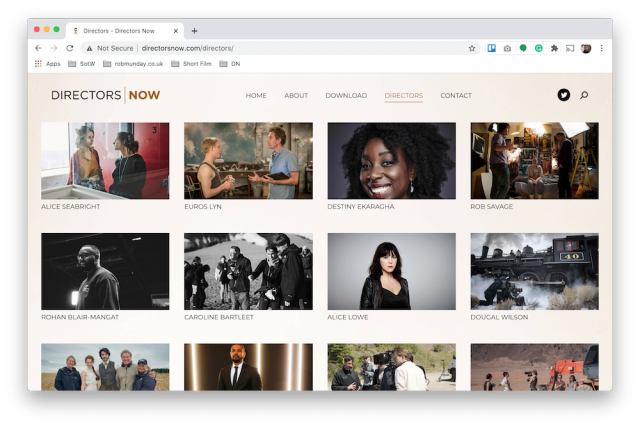
A selection of the individual director stories available on the website
You can read individual director stories on the Directors Now website or download the entire document containing all 105. To keep up-to-date with the project, you can also follow it on Twitter.
 Rob Munday
Rob Munday